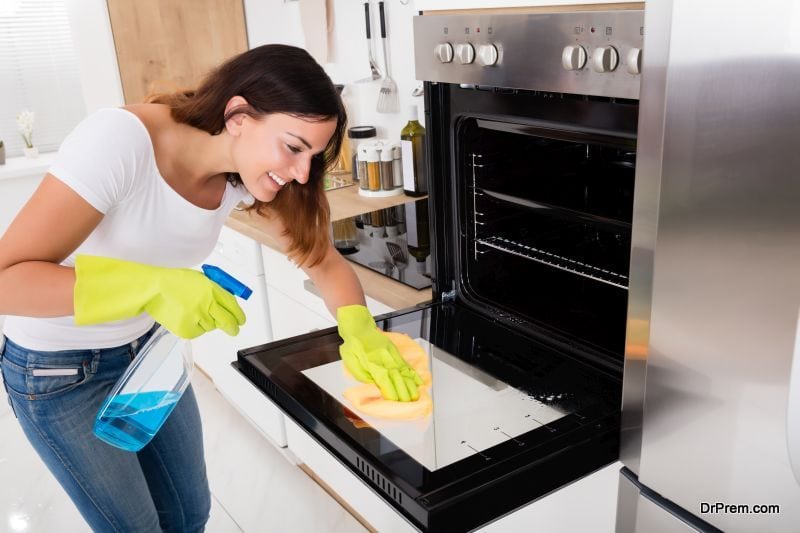The kitchen is the heart of many homes. It’s where meals are made and people gather to talk, mingle, and make memories. Unfortunately, there are also a long list of potential hazards lurking in your kitchen. From the spread of germs to the use of dangerous appliances, you need to be aware of your surroundings in order to stay safe in the kitchen. Check out these 10 health and safety tips.
Store Knives Safely
It’s no secret that knives are sharp and potentially dangerous. It’s important to store them properly. This means in either a butcher block or a specific drawer. If knives are stored in a drawer, invest in covers or sleeves to place them in. This keeps the blade covered and prevents someone from reaching in and accidentally cutting themselves. Never drop knives into soapy water in the kitchen sink. If someone sticks their hand in the water without realizing it, they could easily cut themselves. Always pay attention to what you’re doing when using a knife. Distractions cause accidents.
Wash Your Hands
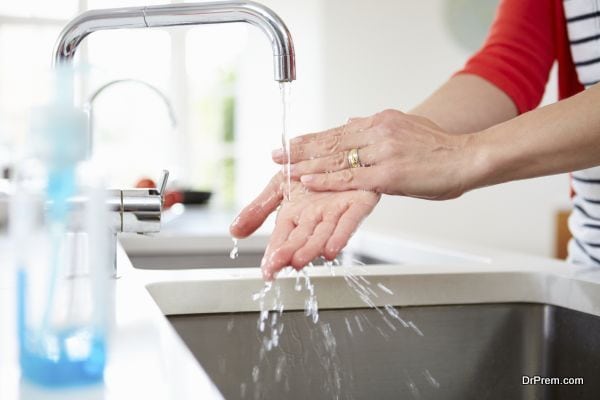 Washing your hands is all about basic hygiene and this is especially true while cooking. This practice isn’t just to prevent contaminating the food but it’s also to keep you safe. You should wash your hands thoroughly before handling any type of food. This will prevent the transfer of germs from your hands to the meal. You should also wash your hands after handling anything that is overly messy or any type of raw meat. Many raw meats, and eggs, contain bacteria like salmonella, which can be easily spread from your hands to kitchen materials and other foods. This can cause cross contamination and make the inhabitants in your home very sick.
Washing your hands is all about basic hygiene and this is especially true while cooking. This practice isn’t just to prevent contaminating the food but it’s also to keep you safe. You should wash your hands thoroughly before handling any type of food. This will prevent the transfer of germs from your hands to the meal. You should also wash your hands after handling anything that is overly messy or any type of raw meat. Many raw meats, and eggs, contain bacteria like salmonella, which can be easily spread from your hands to kitchen materials and other foods. This can cause cross contamination and make the inhabitants in your home very sick.
Don’t Contaminate Surfaces
Another way to prevent the spread of bacteria and potential health hazards is to only use certain surfaces and materials when working with raw and potentially dangerous food and ingredients. Use a small workspace with one cutting board and one knife when cutting raw meat. Don’t touch multiple surfaces with your bare hands. If you use a towel, be sure to dispose of it in the laundry immediately. Bleachsafe towels are a great option for cutting down on the spread of germs and killing unwanted bacteria in the kitchen.
Clean Out Your Fridge
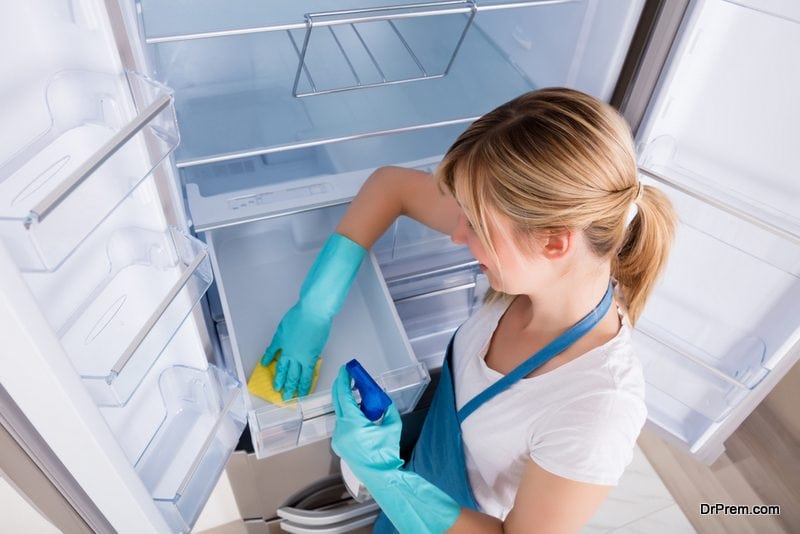 Many of us are guilty of filling our refrigerators with so many different foods, leftovers, condiments, and other containers that we forget about. Whether they are shoved to the back of the fridge, fall behind a shelf or get buried in a drawer, food gets left in the fridge for too long. This is a health hazard for several reasons. If these containers are not marked and don’t show visible signs of aging, you may unintentionally consume food that’s spoiled. These foods can develop mold and potentially contaminate nearby foods as well. It’s also important to clean out your shelves and drawers periodically with warm, soapy water or even bleach. This helps disinfect and wash away food remnants that may have fallen or become stuck to the surfaces over time.
Many of us are guilty of filling our refrigerators with so many different foods, leftovers, condiments, and other containers that we forget about. Whether they are shoved to the back of the fridge, fall behind a shelf or get buried in a drawer, food gets left in the fridge for too long. This is a health hazard for several reasons. If these containers are not marked and don’t show visible signs of aging, you may unintentionally consume food that’s spoiled. These foods can develop mold and potentially contaminate nearby foods as well. It’s also important to clean out your shelves and drawers periodically with warm, soapy water or even bleach. This helps disinfect and wash away food remnants that may have fallen or become stuck to the surfaces over time.
Keep a Clear Stovetop
The stove is one of the most useful and versatile appliances in your kitchen and also the most dangerous. You can boil water on the stove top, fry foods, sautee items, melt cheese, and the list goes on. But whether you have a flat top stove or an older version with open coils, stoves can cause a variety of injuries and hazards if not used properly. The most common and obvious stove top injury is burns. These can occur due to boiling water or steam that can cause scalding. Be sure to cover pots that contain boiling water and never reach through steam. It’s also important to keep stove top surfaces clear of any cloth materials such as towels or pot holders. Don’t hang anything above the stove that could potentially catch fire. And avoid wearing loose fitting clothing that may accidently come in contact with the stove top and catch fire.
Clean Your Oven
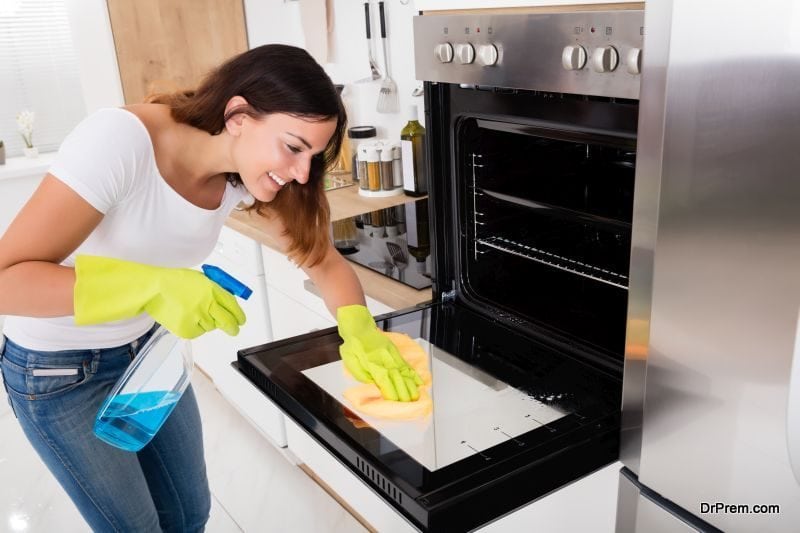 Most ovens have a self cleaning feature. When used, the oven reaches extreme temperatures which helps to burn off the spills and splatters left on the floor and walls of the oven. It’s normal for foods to leave some residue inside of the oven but if left for too long, this debris can catch fire and cause other complications within the unit. It’s important to follow the self cleaning directions. The oven door will lock and remain locked throughout the cleaning process, as well as after, until the temperature comes down. This helps prevent burns or other injuries.
Most ovens have a self cleaning feature. When used, the oven reaches extreme temperatures which helps to burn off the spills and splatters left on the floor and walls of the oven. It’s normal for foods to leave some residue inside of the oven but if left for too long, this debris can catch fire and cause other complications within the unit. It’s important to follow the self cleaning directions. The oven door will lock and remain locked throughout the cleaning process, as well as after, until the temperature comes down. This helps prevent burns or other injuries.
Don’t Leave Cooking Items Unattended
You should never leave cooking items unattended. This includes pots on the stove, items in the oven, or even things heating in the microwave. Electrical fires and other accidents are unpredictable. A controlled flame or other heat source can instantly turn dangerous if left unattended. You also run the risk of a small child or other person in the home entering the kitchen and getting hurt. Grease fires are also common and extremely dangerous. Whenever possible, remain in the kitchen monitoring the stove, oven, microwave or any other appliance while it’s in use.
Clean Up Spills Immediately
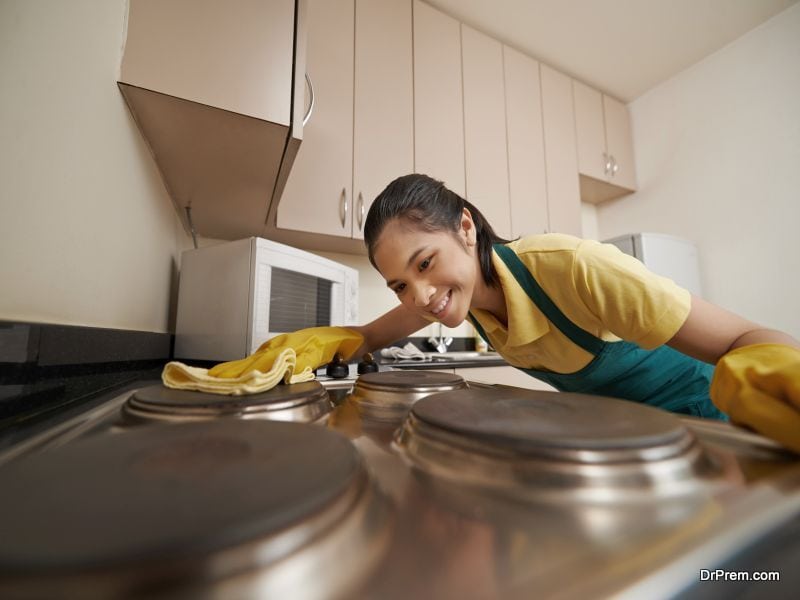 Slips and falls are another common kitchen injury. This is especially true in commercial kitchens but can also apply to your own home. If you spill any type of liquid or other substance onto the floor, be sure to clean it up immediately. Not doing so could result in yourself or someone else slipping and incurring serious injury.
Slips and falls are another common kitchen injury. This is especially true in commercial kitchens but can also apply to your own home. If you spill any type of liquid or other substance onto the floor, be sure to clean it up immediately. Not doing so could result in yourself or someone else slipping and incurring serious injury.
Cooking and spending time in the kitchen should be a fun and relaxing experience. Keep it this way by following these basic health and safety practices.
Article Submitted By Community Writer


